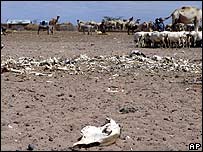
Droughts are becoming more frequent, the report says
|
Climate change is already affecting people across Africa and will wipe out efforts to tackle poverty there unless urgent action is taken, a report says.
Droughts are getting worse and climate uncertainty is growing, the research from a coalition of UK aid agencies and environmental groups says.
Climate change is an "unprecedented" threat to food security, it says.
It calls for a "climate-proof" model of development and massive emissions cuts to avoid "possibly cataclysmic change".
The report, Up In Smoke 2, updates previous research from the organisations - Oxfam, the New Economics Foundation and the Working Group on Climate Change and Development, an umbrella group of aid and green groups.
It says that although climates across Africa have always been erratic, scientific research and the experience of the contributing groups "indicates new and dangerous extremes".
Arid or semi-arid areas in northern, western, eastern and parts of southern Africa are becoming drier, while equatorial Africa and other parts of southern Africa are getting wetter, the report says.
The continent is, on average, 0.5C warmer than it was 100 years ago, but temperatures have risen much higher in some areas - such as a part of Kenya which has become 3.5C hotter in the past 20 years, the agencies report.
Andrew Simms, from the New Economics Foundation, said: "Global warming is set to make many of the problems which Africa already deals with, much, much worse," he said.
"In the last year alone, 25 million people in Sub-Saharan Africa have faced food crisis.
"Global warming means that that many dry areas are going to get drier and wet areas are going to get wetter. They are going to be caught between the devil of drought and the deep blue seas of floods."
He added that the "great tragedy" was that Africa had played virtually no role in global warming, a problem he said was caused by economic activity of the rich, industrial countries.
Mr Simms said unless climate change was tackled all the "best efforts" to help Africa could come to nothing.
One of the biggest threats is growing climate unpredictability, which makes subsistence farming difficult, the report says.
The average number of food emergencies in Africa per year almost tripled since the mid 1980s, it points out.
But it says that better planning to reduce the risk from disasters, together with developing agricultural practices that can withstand changing climates, have been shown to work and could help mitigate the impact if used be more widely.
'Overwhelming'
Up in Smoke 2 also laments the failure of industrialised governments to help developing countries adapt to climate change.
Between $10bn (£5.2bn) and $40bn is needed annually, the report says, but industrialised countries have given only $43m - a tenth of the amount they have pledged - while rich country fossil fuel subsidies total $73bn a year.
The agencies say that greenhouse emissions cuts of 60% - 90% will ultimately be needed - way beyond the targets set in the Kyoto agreement.
"Climate change is overwhelming the situation in Africa... unless we take genuine steps now to reduce our emissions, people in the developed world will be condemning millions to hunger, starvation and death," said Tony Juniper, executive director of Friends of the Earth.
The report comes two weeks before a key summit on climate change in Nairobi, where delegates will look at the progress made on the Kyoto agreement that requires industrial nations to cut their emissions by an average of 5.2% from 1990 levels by the period 2008-2012.


~RS~q~RS~~RS~z~RS~31~RS~)